Why You Need a Portable Heater for Tent Camping
Camping in cold weather can be challenging. A portable camping heater for your tent ensures comfort and safety. It keeps the inside of the tent warm, preventing hypothermia or discomfort during chilly nights.
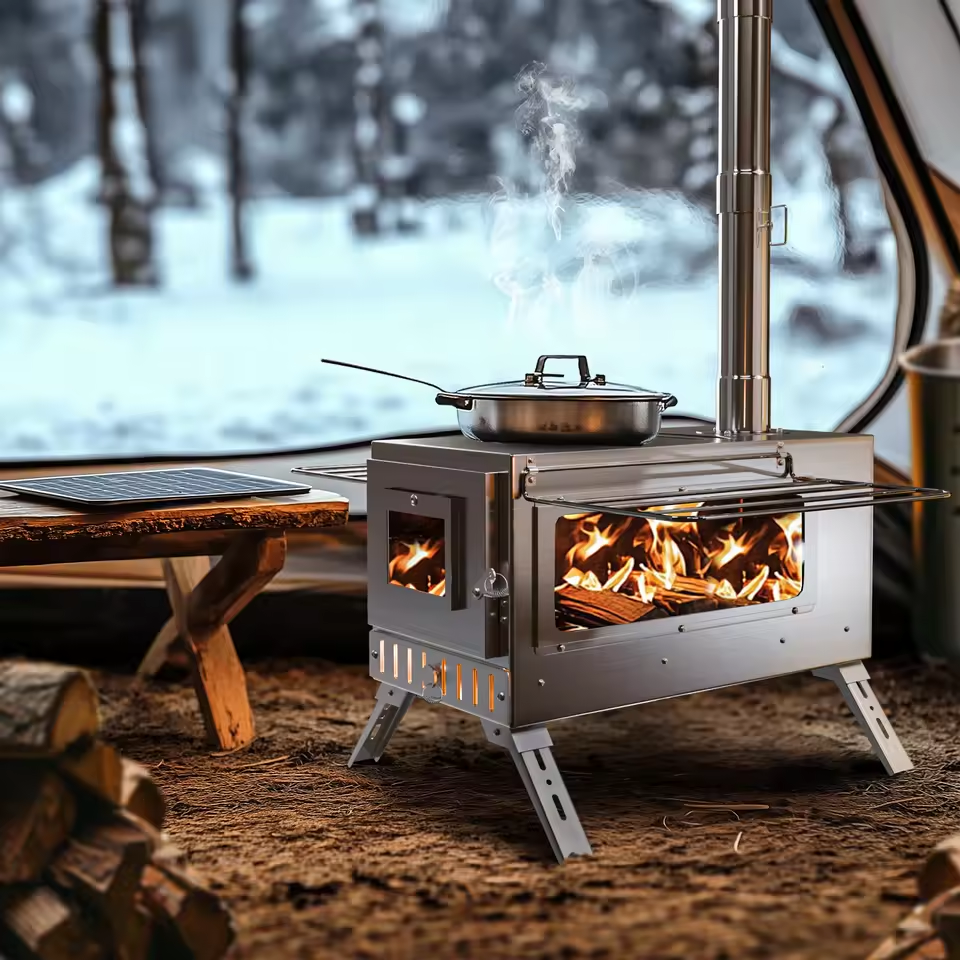
Sleeping in an unheated tent can disturb your rest. A heater provides consistent warmth, allowing you to sleep soundly. Warm environments also reduce condensation inside the tent, protecting your gear from moisture damage.
Portable heaters are essential for extending your camping season. They let you camp during colder months or at higher elevations. This means more adventurous trips and exploring places you might avoid in freezing temperatures.
Choosing the right heater can make your trip more enjoyable. Look for compact designs and easy-to-use options. It’s also important to select heaters that suit your specific camping needs. Having the right portable heater ensures you stay comfortable regardless of the weather.
Types of Portable Camping Heaters
Different types of portable camping heaters suit varying needs and conditions. Choosing the right heater ensures warmth and comfort during your camping trip. Below are the most common types:
Propane Heaters
Propane heaters are one of the most popular choices for tent camping. They run on small propane tanks, making them easy to use and portable. These heaters provide strong and consistent heat. They are ideal for extremely cold nights. However, they require proper ventilation to prevent carbon monoxide buildup. Always ensure your tent has vents open when using them.
Electric Heaters
Electric heaters are perfect for campsites with access to power. They are safe and produce no harmful fumes. Many models include thermostats, allowing precise temperature control. However, they depend on an electrical hookup, limiting their use in remote locations. Keep in mind that these heaters are often less powerful than propane models.
Butane Heaters
Butane heaters are another portable option suitable for tent camping. They are lightweight and compact, which makes them easy to carry. Like propane heaters, they need proper ventilation in the tent. Butane canisters are also readily available but can be less effective in very low temperatures.
Battery-Powered Heaters
Battery-powered heaters are compact and easy to use. They are ideal for short trips or emergencies. These heaters don’t rely on fuels or electricity, making them versatile. However, they provide limited heat and may not last long in extremely cold weather. They are best for supplemental warmth.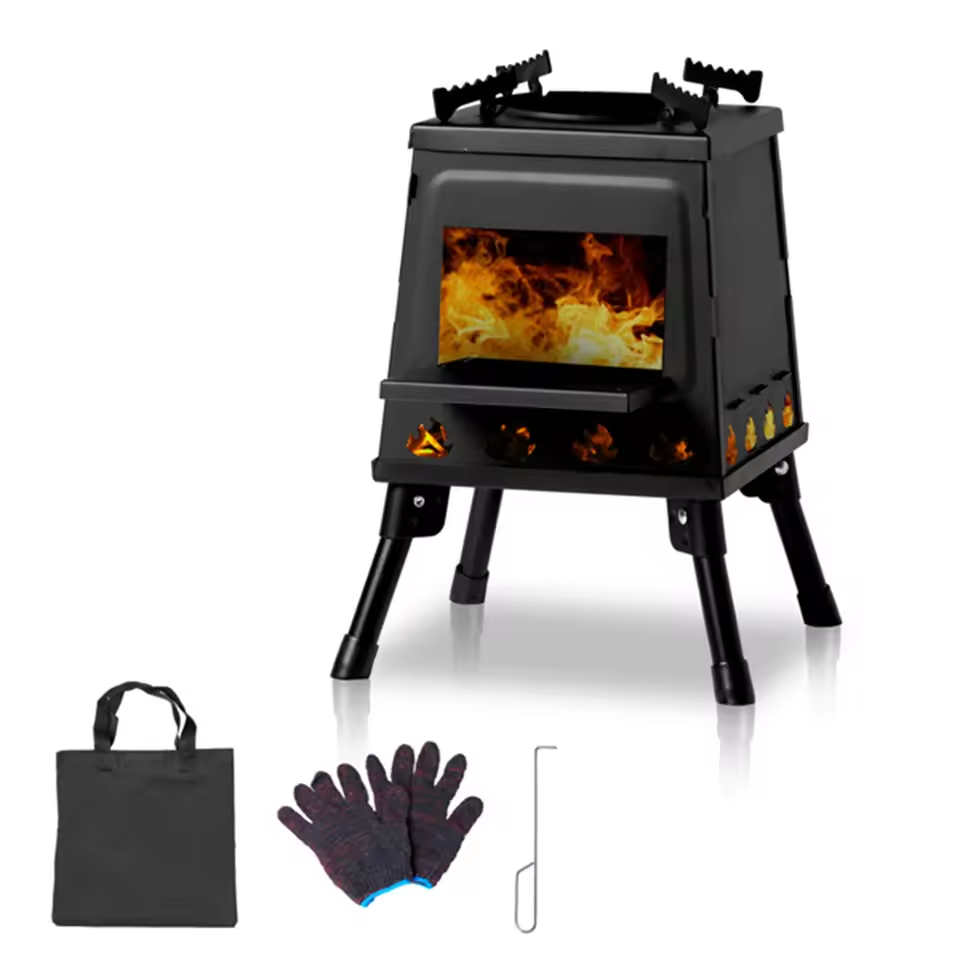
Each type has its strengths and weaknesses. Choose a portable camping heater for your tent that matches your needs and camping conditions.
Features to Look for in a Tent Heater
When choosing a portable camping heater for your tent, certain features are essential. These features ensure the heater is safe, efficient, and suits your camping needs. Below are the key aspects to consider:
Portability
A good camping heater should be compact and lightweight. This makes it easy to carry and pack. Portability is crucial if you’re hiking or moving between campsites.
Heat Output
Check the heater’s BTU (British Thermal Units) rating. Higher BTUs mean more heat for your tent. Choose a heater based on the size of your tent and the expected weather.
Fuel Source or Power Type
Different heaters use different power sources, like propane, electricity, or batteries. Pick a heater based on fuel availability and campsite resources. Propane is great for remote areas, while electricity works well at powered campsites.
Safety Features
Safety is critical when using heaters in enclosed spaces. Look for features like automatic shut-off for tipping or low oxygen levels. These can prevent accidents and keep you safe while camping.
Run Time
Consider how long the heater can operate on one fuel refill or charge. Longer run times mean less refueling and more warmth during the night. Check the specifications for continuous heating durations.
Noise Level
Some heaters can be noisy during operation. Choose a model that runs quietly to avoid disturbing your sleep. Quiet heaters enhance your camping experience and ensure restful nights.
Ease of Use
Select a heater that is simple to operate, even in low light. Features like intuitive controls and ignitions are helpful. Easy-to-use heaters save time and effort, letting you enjoy your trip more.
By evaluating these features, you can find a portable camping heater for your tent that fits your needs. Investing in the right heater enhances comfort and safety during your outdoor adventures.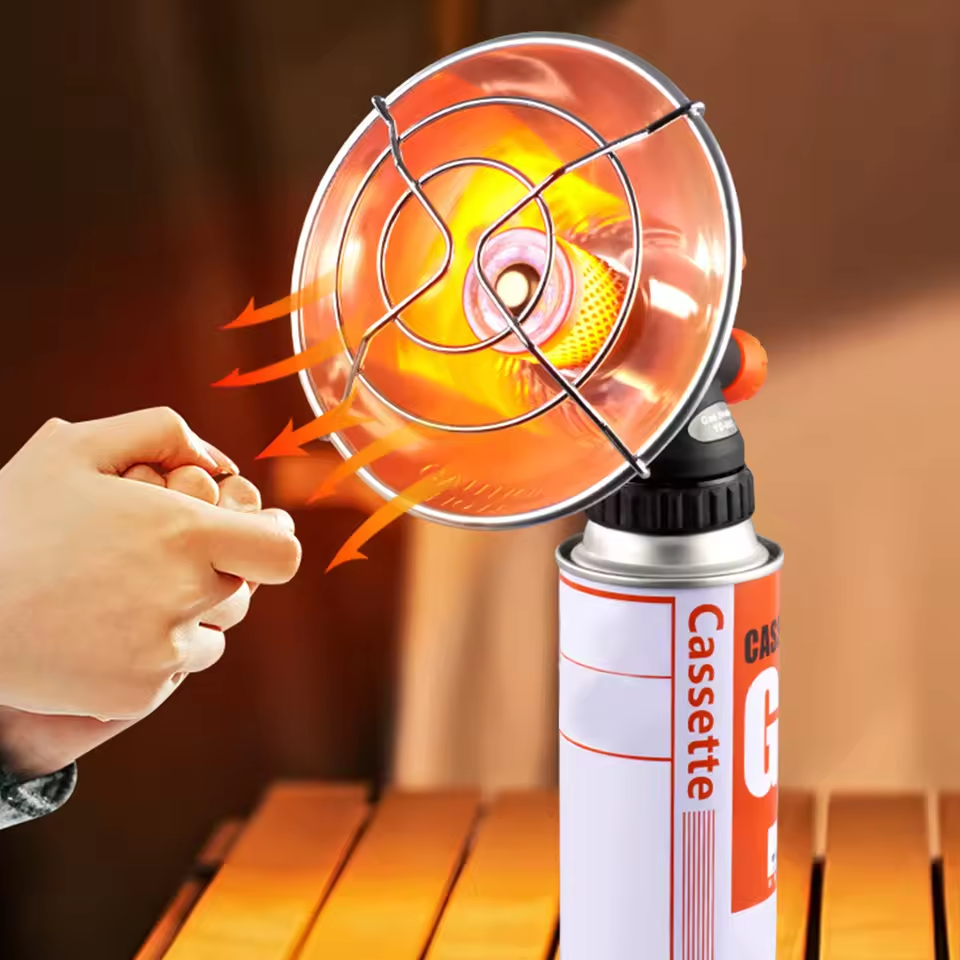
Safety Tips When Using a Portable Heater in a Tent
Using a portable camping heater for your tent requires extra caution. Safety should always be your priority. Mishandling heaters can lead to serious risks like fires or carbon monoxide poisoning. Here are essential safety tips to help you stay warm and safe:
Ensure Proper Ventilation
- Always keep a vent or window slightly open while using a heater.
- Proper airflow reduces the risk of carbon monoxide buildup in the tent.
- Avoid sealing your tent completely when the heater is on.
Use Heaters with Safety Features
- Select models with automatic shut-off features for tipping or low oxygen levels.
- Safety switches greatly increase your protection in enclosed spaces.
- Ensure the heater has a stable base to prevent accidental tipping.
Monitor Fuel Usage Carefully
- Check fuel levels frequently to avoid overheating or running out mid-use.
- Use only the recommended fuel for your specific heater.
- Store extra fuel away from the heater to prevent fire hazards.
Place the Heater on a Stable Surface
- Always set the heater on flat, non-flammable surfaces.
- Keep the heater away from tent walls, sleeping bags, or other flammable items.
- Ensure the area around the heater is clear of clutter.
Never Leave the Heater Unattended
- Turn off the heater when leaving the tent or going to sleep.
- Supervise the heater at all times during use.
- Do not rely on heaters to run overnight unless they are explicitly designed for that.
Keep Emergency Equipment Nearby
- Always have a fire extinguisher or bucket of water within reach.
- Carry a carbon monoxide detector if you’re using gas-based heaters.
- Familiarize yourself with emergency response plans before your trip.
Read and Follow Manufacturer’s Instructions
- Carefully review the heater’s manual before using it.
- Follow all guidelines for installation, refueling, and maintenance.
- Contact the manufacturer if you have questions about safe use.
By practicing these safety tips, you can confidently use a portable camping heater for your tent. These precautions will ensure you stay warm without compromising your well-being during your camping adventures.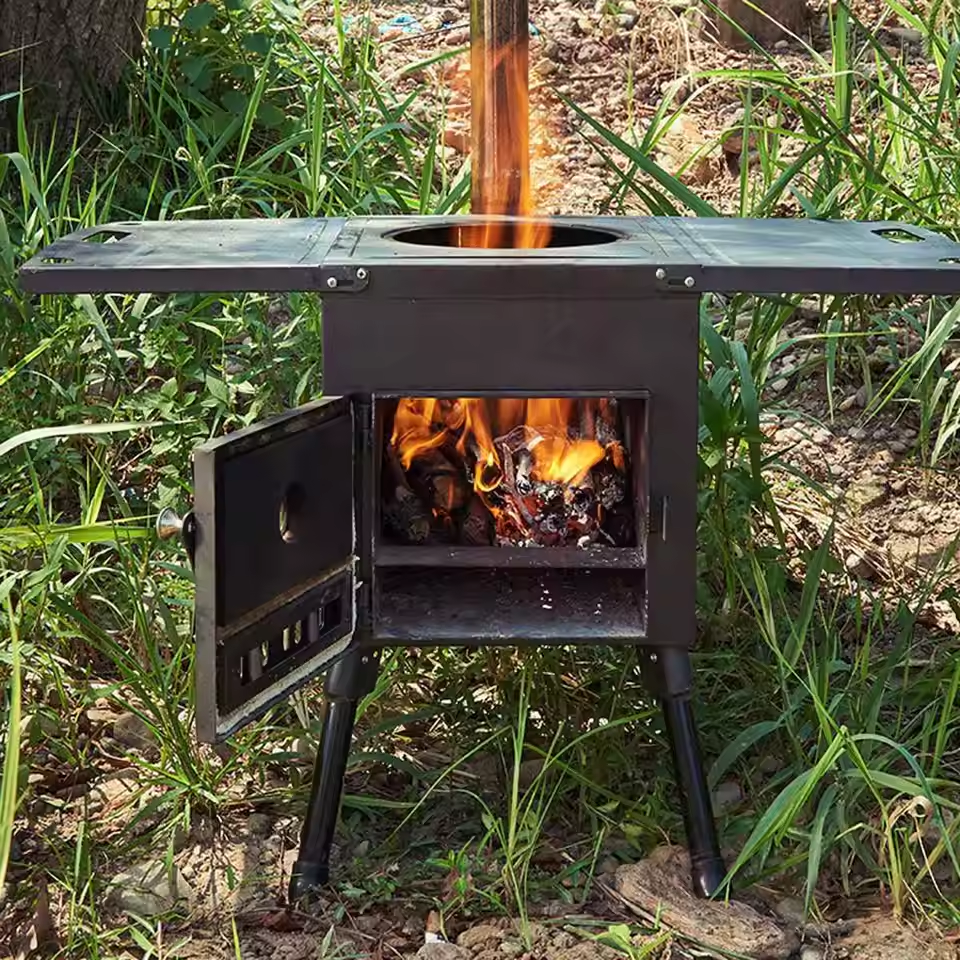
Top Portable Camping Heaters for 2023
Choosing the best portable camping heater for your tent can improve your outdoor experience. In 2023, several top heaters stand out for their efficiency, safety, and reliability. Here’s a list of some of the best options to consider:
Mr. Heater Buddy
- Key Features: Runs on propane, offers up to 9,000 BTU, and includes safety shut-off.
- Best For: Compact size and strong heating in large tents.
- Advantages: Highly portable, quick heating, and excellent safety features.
Lasko Ceramic Heater
- Key Features: Electric-powered, lightweight design, and adjustable thermostat for precise temperature control.
- Best For: Campsites with power access.
- Advantages: Safe operation and simple controls; no fumes or fuel to manage.
Coleman Propane SportCat Heater
- Key Features: Up to 1,500 BTU, propane-powered, and features an easy-grip handle.
- Best For: Smaller tents needing moderate heat.
- Advantages: Convenient size, reliable performance, and efficient fuel usage.
Honeywell HeatBud Heater
- Key Features: Compact, electric-powered heater with low energy consumption.
- Best For: Supplemental warmth in mild cold conditions.
- Advantages: Small and lightweight, quiet operation, and quick heat response.
Texsport Portable Outdoor Heater
- Key Features: Propane-powered, sturdy metal frame, and adjustable regulator.
- Best For: Outdoor use and spacious tents.
- Advantages: Durable design, easy portability, and stable heating output.
Stansport Deluxe Butane Heater
- Key Features: Butane-powered with adjustable heat controls and lightweight construction.
- Best For: Remote camping trips.
- Advantages: Compact, easy to carry, and operates efficiently in cool weather.
Investing in the right heater for your tent ensures comfort and safety during cold camping trips. Match the heater with your specific needs for the best experience in 2023.
How to Maintain and Store Your Camping Heater
Proper maintenance and storage of your portable camping heater for tent use is crucial. These steps will ensure safe operation and prolong the heater’s lifespan.
Regular Cleaning
- Clean your heater after each trip to remove dirt and debris.
- Use a soft brush or cloth to clean external parts.
- For gas heaters, check and clean the burners for blockages.
Inspect for Damage
- Look for dents, cracks, or rust before using the heater.
- Inspect hoses and connections for leaks or wear.
- Replace damaged parts immediately to prevent safety issues.
Check Fuel Components
- Ensure fuel valves are tight and secure before storage.
- Empty any remaining fuel to avoid leaks during storage.
- Never store fuel canisters inside the heater.
Follow Manufacturer Guidelines
- Refer to the user manual for specific maintenance instructions.
- Use recommended tools and practices for cleaning and servicing.
- Avoid making modifications that void the warranty.
Proper Storage Conditions
- Store your heater in a cool, dry place away from moisture.
- Keep it in a protective cover to avoid dust buildup.
- If battery-powered, remove batteries to prevent corrosion.
Schedule Seasonal Maintenance
- Perform a thorough check before camping in cold months.
- Test the heater’s operation at home to ensure it works properly.
- Lubricate moving parts if recommended by the manufacturer.
Avoid Long-Term Neglect
- Don’t leave your heater unused for long periods without checking.
- Regular upkeep ensures it remains reliable when needed.
By maintaining and storing your portable camping heater correctly, it will always be ready for your next tent adventure.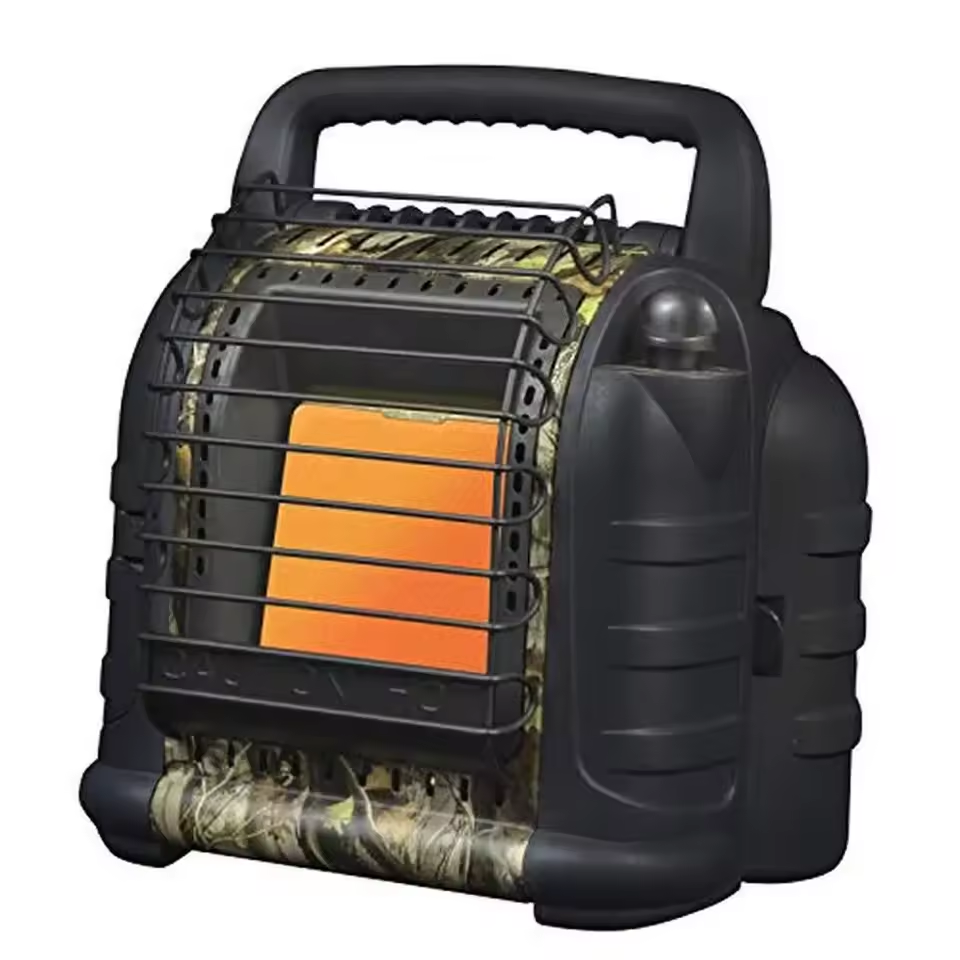
Tips for Maximizing Heat Efficiency in Your Tent
Keeping your tent warm efficiently can save energy and enhance your camping experience. A few adjustments can make a significant difference in warmth retention. Here are actionable tips to maximize heat efficiency:
Choose the Right Tent and Location
- Pick tents with insulated walls or thermal layering for better heat retention.
- Set up the tent in a wind-sheltered area to minimize heat loss.
- Avoid pitching the tent on wet or rocky ground, as cold surfaces drain warmth.
Use Tent Accessories for Insulation
- Add a carpet or foam mat inside the tent to block cold from the ground.
- Hang a thermal blanket or tarp inside for extra insulation.
- Use a rainfly to prevent cold air from seeping in through tent walls.
Seal All Gaps and Openings
- Close doors and windows tightly to prevent drafts.
- Use cloth or duct tape to seal small holes or gaps.
- Ensure zippers are fully closed when the heater is in use.
Strategically Place Your Portable Camping Heater
- Place the heater near the center of the tent for evenly distributed warmth.
- Avoid placing it near walls, which may trap heat or create condensation.
Layer Your Gear Efficiently
- Use sleeping bags rated for cold weather to reduce heat loss.
- Wear insulated clothing to stay warm without entirely relying on the heater.
- Keep extra blankets handy for layering over your gear.
Manage Heat Flow Inside the Tent
- Use fans or air circulators to spread warmth evenly from the heater.
- Position reflective surfaces near the heater to direct heat distribution.
Minimize Heat Loss During the Night
- Turn off the heater at night if it isn’t made for continuous use.
- Bundle up in warm bedding to retain heat without relying on external sources.
- Reduce the tent’s interior space with partitions for better heat concentration.
By applying these tips, you can improve the heat efficiency in your tent and enjoy a cozy camping experience, even in the coldest weather conditions.